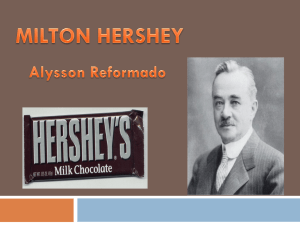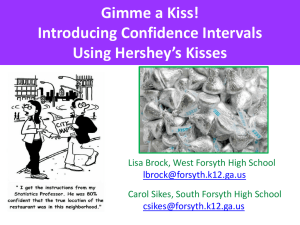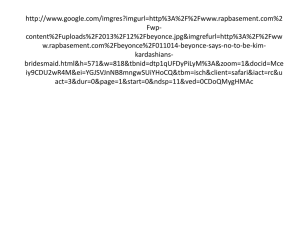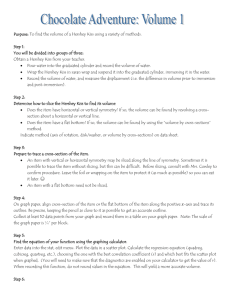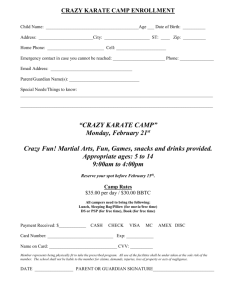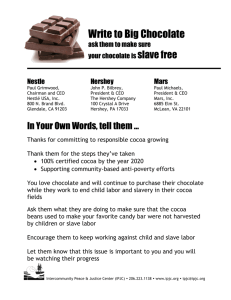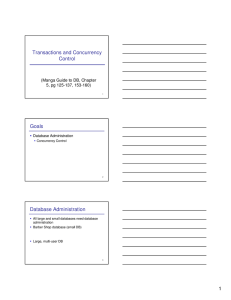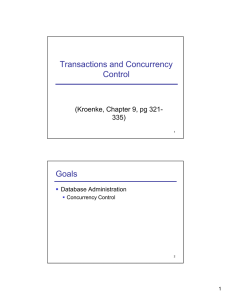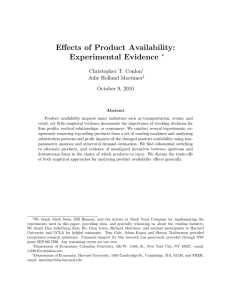The appeal of “Free!”
advertisement
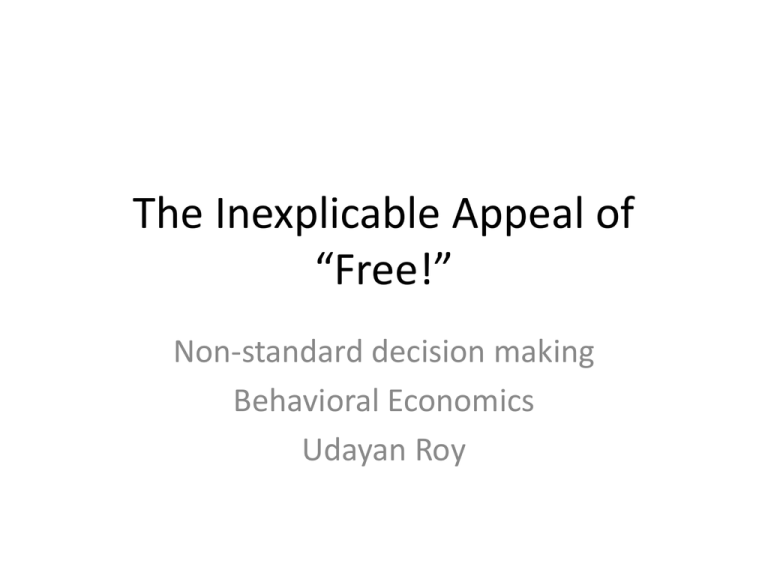
The Inexplicable Appeal of “Free!” Non-standard decision making Behavioral Economics Udayan Roy Reading • Predictably Irrational – Chapter 3 The Cost of Zero Cost It’s Free!!! • We seem to lose all sense when told that something or other is free • Our ability to make intelligent trade-offs deteriorates when the price drops to zero • We tend to choose a “free” option even when it is clearly inferior to other options Chocolate Experiment • Students were offered the opportunity to buy one chocolate per person at reduced prices • Here are the results: Situation A Situation B Price $ Quantity % Price $ Quantity % Lindt truffles 0.15 73 0.14 31 Hersheys kisses 0.01 27 0.00 69 Another chocolate experiment • Each child is given 3 Hershey’s Kisses and then offered a trading opportunity • Group 1 – 1 Snickers bar for 2 Hershey’s kisses, or – ½ Snickers bar for 1 Hershey’s kiss Most kids took this • Group 2 – 1 Snickers bar for 1 Hershey’s kiss, or – ½ Snickers bar for free Most kids took this In both cases, one could get an additional Snickers bar by giving up one Hershey’s kiss. This trade off is popular for Group 1, but not when a “free” option is available. Amazon.com gift cards experiment • • • • One gift card per person Offer 1: $20 gift card at a price of $7 Offer 2: $10 gift card for free Guess which one was the overwhelming favorite! Amazon.com in France • For some reason, amazon.com in France was not showing sales levels that were achieved in all other countries • It turned out that all other countries had free shipping while there was a one Franc (about 20 cents) shipping fee in France • When shipping became truly free in France, sales quickly jumped up to the levels in other countries Free! drives us crazy • Clearly our ability to make rational trade-offs is completely gone when something reaches the magical price of “free!” Video • Free! by Dan Ariely: http://www.youtube.com/watch?v=LmJzQ3cV t88 • When Free is Dangerous by Dan Ariely: http://youtu.be/TlXjdW0xQco • Free and Irrationality by Dan Ariely: http://youtu.be/MDQf6x8tcXA Free! drives us crazy • We may opt for a free bank account and spend $6.00 per month on online banking instead of a bank account with a $5.00 monthly fee that provides free online banking • We may pay $10,000 more for a car that comes with free oil changes even though the cost of oil changes over the car’s lifetime may be less than $6,000 Free! drives us crazy • We may go to the zoo on a day admission is free even though we’d be much happier going on another day when admission is $15 Free! drives us crazy • Barnes and Noble sells a member card with a $50 annual fee that entitles the member to 10% discount • I don’t buy it even though I would save more than $50 annually from the discount • The card would be more popular, I think, if it was free, even if the discount was 3% • Is Barnes and Noble being stupid? Free! drives us crazy • Yes, B&N is indeed being stupid in the sense that we have been discussing • But we will later see that B&N may be relying on other psychological quirks in us – We may buy the card thinking we’ll use it a lot (and, therefore, save a lot of money from the card’s discount) and then not use it much – Or we may buy more books than we normally would; having paid for the card, we’d want to use it Free! drives us crazy • As a policy maker, if you wish people to do X (whatever X is), don’t just reduce the price or fee people must pay to do X, make it free! – X could be taking the flu shot, buying nicotine patches (if you are a smoker), taking online courses, etc.
